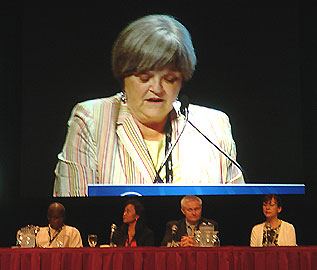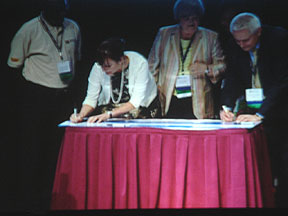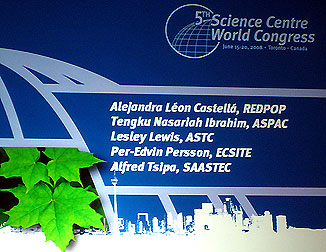Boletín  Junio, 2008
Junio, 2008
Boletín  Junio, 2008
Junio, 2008
Toronto Declaration specifies Science Centres? Goals and Future Role as Agents of Change
Declaration sets Inspirational Agenda for Science Centres around the world
Toronto, Ontario - (June 19, 2008) At the conclusion of the 5th Science Centre World Congress hosted by the Ontario Science Centre, the international science centre community issued the Toronto Declaration, committing to the field?s first-ever shared global statement of beliefs and goals. Establishing a new benchmark for Congresses, the document set out six key commitments designed to guide the regional networks and their members until the 6th Science Centre World Congress to be held in South Africa in 2011.
5th Science Centre World Congress
From June 15 to 19, 2008, more than 400 delegates from 51 countries joined together in Toronto for the triennial 5th Science Centre World Congress, hosted by the Ontario Science Centre at the Metro Toronto Convention Centre. Over four days, the world?s top science centre leaders along with colleagues from academic institutions, corporations and government, joined to discuss the central role science centres play in increasing the public?s engagement with science. 2008 marked the first time the international congress has been held in North America. Further information and details about the 5th Science Centre World Congress can be found by visiting www.5scwc.org.
 |
Closing Ceremony / Toronto Declaration
The 5th Science Centre World Congress was a special gathering that allowed members of the science centre community to step outside their regular regional networks and engage with colleagues from around the world. A pivotal outcome of the Congress was the Toronto Declaration, which was read and endorsed by delegates at the closing ceremony. This is a landmark event for our field, said Lesley Lewis, CEO of the Ontario Science Centre, Chair of the Congress and current President of ASTC. For the first time, science centres around the world have worked together to issue a collective statement that identifies the issues facing our field globally. Today we have committed to a series of actions that will guide us for the next three years. The ideas that emerged through consultation with science centre networks
around the world will be powerful motivators for action, she added.
In 2008, science literacy is as important as other forms of literacy
and numeracy. Science centres have relevance to all sectors of the population
and have become important meeting places for science and society. They
operate across geographical, economic, political, religious and cultural
boundaries. They impact the well-being, education, achievement and skills
of current and future generations. They are safe places for difficult
conversations.
|
Science is key to understanding the world around us, and science centres play an essential role in engaging citizens with science, said Dr. Persson, the former President of the Association of Science-Technology Centers (ASTC). Science centres are places where science and society intersect; we help people understand the world and take action.
Each year, 290 million citizens actively participate in the exhibitions, programs, events and outreach initiatives organized by 2,400 science centres worldwide, said Tengku Nasariah Ibrahim, CEO of Petrosans and President of the Asia-Pacific Network of Science Centres. The Toronto Declaration will inspire science centres to enhance their offerings and engage the public with science in a way that can help them understand global issues and create a better future. This is a major milestone for the science centre community.- We, the participants in the 5th Science Centre World Congress, believe that science is an important tool for a better life on our planet.
- We advocate that all citizens should have access to a science centre or its services in their own region. We will use our collective expertise and experience in helping to expand the activities of our sector to places and communities where science centres are needed and wanted but not yet established.
- We commit to work together to overcome cultural, physical, social, economic and geographic barriers to engage and connect people through science.
- We will actively seek out issues related to science and society where the voices of citizens should be heard and ensure that dialogue occurs.
- We will work together to identify how science centres can contribute to the achievement of the United Nations Millennium Goals.
- We will search for funding and mechanisms to create a better future for all through global engagement with issues of local, national and global relevance, including environmental awareness, science education and innovation.
The Declaration was drafted by a six member committee of leaders from the global science centre community led by Lesley Lewis. |
 |
 |
In addition, delegates signed a copy of the declaration as they departed the Congress. |
A Green Congress
The Ontario Science Centre made a commitment to environmental sustainability by delivering a green congress. Registration fees included a green levy to be applied to the cost of carbon offsetting. Congress organizers chose Offsetters Climate Neutral Society, a Canadian non-profit organization that invests in projects using the next generation energy sources. Examples of projects include the replacement of charcoal burning cook stoves with solar powered ones in West Africa; building groundsource heat pumps to produce energy at a school in the Secwepemc territory of British Columbia; and using waste wood to fuel an energy efficient boiler to heat a greenhouse?the amount of C02 emitted into the air is equal to what would be released by natural decomposition.
Sponsors
The government of Ontario was the lead sponsor of this congress. Other partners came from an impressive range of leaders in innovation, including Presenting Sponsors Nortel and Siemens; Plenary Sponsor Natural Sciences and Engineering Research Council of Canada; and IMAX Corporation as Sponsor of the Keynote speech Creating the Future.
| La RED POP,
es una red interactiva que surge de la convocatoria realizada por
UNESCO en 1990 y reúne a centros, museos y programas de popularización
y divulgación de a ciencia y la tecnología en América
Latina y el Caribe. Funciona mediantes mecanismos regionales de cooperación
que favorecen el intercambio, entrenamietno y aprovechamiento de recursos
entre sus miembros.
CIENTEC es miembro fundador y actualmente ocupa la Dirección Ejecutiva de la RED. |
A Red-POP
é uma rede interativa que surge de uma convocação
realizada pela UNESCO em 1990 e reúne centros, museus e programas
de popularização e divulgação da ciência
e tecnologia na América Latina e Caribe. Funciona mediante
mecanismos regionais de cooperação que favorecem o intercâmbio, o
treinamento e o aproveitamento de recursos entre seus membros.
O CIENTEC é membro fundador e atualmente ocupa a Direção Executiva da RED. |
__
/\_\ __ ___ __ ___ ____ ___ ___
\/\ \\ \ / / /__ /| / / /__ /
/\/_//_/ /___ _/_ /___ / |/ / /___ /___
\/_/Tel:(506) 2233-7701 ó 2258-3583, Fax:(506) 2255-2182
P.O.Box 8536-1000, San José, Costa Rica